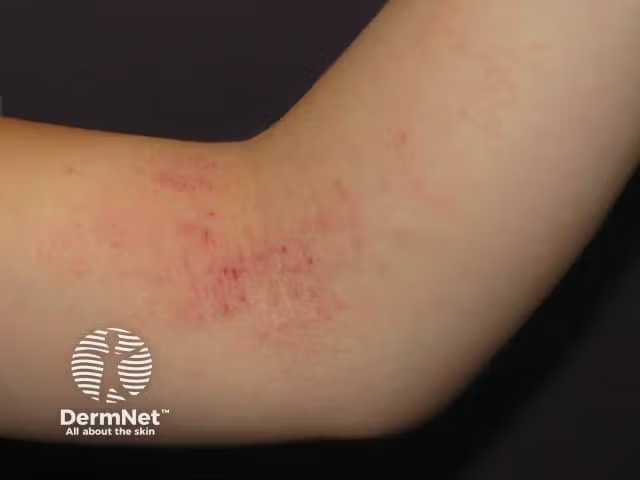- Case-Based Roundtable
- General Dermatology
- Eczema
- Chronic Hand Eczema
- Alopecia
- Aesthetics
- Vitiligo
- COVID-19
- Actinic Keratosis
- Precision Medicine and Biologics
- Rare Disease
- Wound Care
- Rosacea
- Psoriasis
- Psoriatic Arthritis
- Atopic Dermatitis
- Melasma
- NP and PA
- Skin Cancer
- Hidradenitis Suppurativa
- Drug Watch
- Pigmentary Disorders
- Acne
- Pediatric Dermatology
- Practice Management
- Prurigo Nodularis
- Buy-and-Bill
Commentary
Video
Rezpeg vs Existing Therapies: A Paradigm Shift in Atopic Dermatitis Treatment
Author(s):
Jonathan Zalevsky, PhD, discusses the fundamentally different path of Rezpeg compared with existing IL-4 and IL-13 inhibitors in atopic dermatitis.
Nektar Therapeutics recently announced that the FDA granted Fast Track designation to its investigational drug rezpegaldesleukin (Rezpeg) for the treatment of atopic dermatitis (AD).1
Read more from Dermatology Times.
In a recent interview with Dermatology Times, Jonathan Zalevsky, PhD, chief of research and development at Nektar Therapeutics, explored the importance of this designation, the unmet need in AD treatment, and the unique aspects that distinguish rezpegaldesleukin from current therapies. In part 2 of the conversation, Zalevsky discusses the unique mechanism of action of rezpegaldesleukin and how it fits into the current AD armamentarium.
Comparing Rezpeg to Existing Biologic Treatments for AD
In the evolving landscape of AD treatment, biologics targeting interleukin (IL)-4 and IL-13 pathways have dominated therapeutic options. Rezpegaldesleukin, a novel therapy, activates regulatory T cells (Tregs) instead of blocking inflammatory cytokines, Zalevsky noted.
Current biologic treatments for AD—such as dupilumab (Dupixent), tralokinumab (Adbry), and lebrikizumab (Ebglyss)—focus on neutralizing the effects of interleukin (IL)-4 and IL-13.
“Dupilumab targets the heterocomplex of IL-4 and IL-13 because it signals as a heteromer, whereas Adbry and lebrikizumab target either IL-13, the cytokine itself, or they target IL-13 R1, receptor 1,” Zalevdky explained.
These biologics interfere with the signaling pathways responsible for the Th2 immune response, a key driver of AD inflammation. IL-13, in particular, plays a significant role as a secondary Th2 cytokine.
“IL-13 is important because it's a key secondary Th2 cytokine. It mediates a lot of secondary molecules like IL-22 and other molecules like CCL-7 and CCL-17 and 22 and so on,” Zalevsky added.
By modulating these pathways, IL-4 and IL-13 inhibitors effectively reduce inflammation and symptom severity in patients with AD.
“Rezpeg, on the other hand, is completely different. For one thing, it's not an antagonist drug like those IL-13 receptor or ligand blockers. Rezpeg is an agonist,” Zalevsky noted.
Unlike receptor-blocking biologics, rezpegaldesleukin stimulates the expansion and activity of regulatory Tregs, which naturally suppress inflammation. Rather than acting as a GPCR agonist like albuterol, rezpegaldesleukin is a cellular agonist.
“It actually binds the IL-2 receptor-expressing cells in the body, and that's almost exclusively from the case of Rezpeg onto Treg specifically,” Zalevsky explained. By increasing both the number and function of Tregs, rezpegaldesleukin enhances the body's intrinsic ability to regulate immune responses.
Tregs play a crucial role in immune homeostasis, preventing overactive immune responses and autoimmune reactions. “These cells are the body's sort of natural defense mechanism to auto-reactive T cells, whether that's T cells that are breaking tolerance or T cells that are actively causing inflammation in response to an antigen,” Zalevsky elaborated.
When a Treg encounters an antigen, it downregulates the inflammatory response, restoring balance to the immune system.
Rezpegaldesleukin leverages this mechanism to control AD-related inflammation. “Rezpeg’s mechanism is to agonize the Treg pool in the patient, and each time you take an administration, you'll get a new Treg expansion,” he said.
Study Outcomes
In the latest clinical study on rezpegaldesleukin, the results indicated a notable improvement in symptoms, with patients showing substantial reductions in skin inflammation and pruritus.
“Our phase 1b results showed strong evidence of skin improvement across different inflammatory skin conditions,” Zalevsky said. The drug exhibited a rapid onset of action, with many patients seeing visible improvements within weeks of treatment.
The study also assessed safety, with adverse events being generally mild and manageable. Most patients experienced minimal adverse effects, such as mild injection site reactions, which resolved quickly. The treatment was well-tolerated overall.
A key aspect of the study was the evaluation of patient-reported outcomes, which revealed high satisfaction rates among participants. Many patients reported improved quality of life, as they were able to manage their symptoms more effectively with rezpegaldesleukin compared to previous treatments.
Reference
- Nektar Therapeutics receives fast track designation for rezpegaldesleukin for the treatment of moderate-to-severe atopic dermatitis. News release. PRNewswire. February 10, 2025. Accessed February 14, 2025. https://www.prnewswire.com/news-releases/nektar-therapeutics-receives-fast-track-designation-for-rezpegaldesleukin-for-the-treatment-of-moderate-to-severe-atopic-dermatitis-302371995.html






